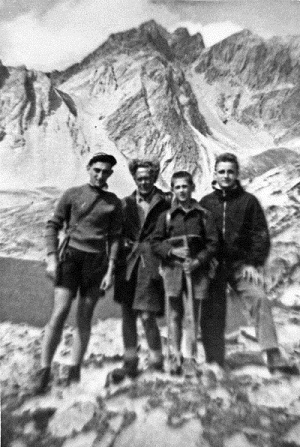
I’m a pessimist because of intelligence, but an optimist because of will. ~ Antonio Gramsci: Letters from Prison (December 19th, 1929)
Unless a capacity for thinking be accompanied by a capacity for action, a superior mind exists in torture. ~ Benedetto Croce
Based on Julius Evola’s article that Rene Guenon quoted, and objected to, in his letter to Guido de Giorgio, we will make the case in Evola’s defense. At a later date, we will provide a counter argument from Guenon’s point of view.
Rationalism
Evola rejects any system of thought that posits itself above the Self and demands thereby the subjection of the self. Any such system of though he calls “rationalism”. Hence, he would reject, at least as first principle, something like Guenon’s multiple states of the Being. That is not the Absolute for Evola; rather, the Self is the Absolute, as Atman is Brahman. The Absolute is something to realized, reached, or achieved; that is the only way to “know” it. The logical arguments used by Guenon can only be secondary.
This Absolute Self is above thought; hence it cannot be reduced to the “sentimental, moralist, and abstractly rational element”. In this he agrees with Guenon. Yet he rejects Guenon’s distinction between the intuition (nous) and the rational mind (dianoia), relating it to the same distinction made by Hegel. Since the Absolute Self is totally free, and not subject to any system, its principle can only be will or power: Shakti as Evola calls it. In this, he is in the current of Italian idealism, even with his intellectual nemesis, Giovanni Gentile, who likewise rejection rationalism, as the following quote shows:
Fascism is and should be an enemy without truce or pity, not against intelligence, but against intellectualism which is a disease of the intelligence—for intelligence too is will, and fascism at least feels this, disdaining the culture that is an ornament or adornment of the brain and longing for a culture by which the spirit is armed and fortified for winning ever new battles.
So, for Evola, East and West are two equal ideal types, although manifesting in different ways. Guenon, on the other hand, privileges intellectualism, the upshot of which is that he considers the East to be superior to the West, almost by definition. One of the distinguishing details for Evola is the development of science in the West as a manifestation of the Will to Power. Guenon sees science as a form of decadence, but that is true only when science wants to make itself into an absolute, intellectual system.
Scire
So Evola is in agreement with the Hermetic principle: “Know, will, and dare.” What, then, does the Self know, if not a system of thought? This “knowing” can only be a direct experience, known in one’s being, almost a carnal knowledge in the flesh. The problem with rationalism is that it is not self-sufficient, requiring data to operate on. A philosophical or scientific theory, therefore, will address the data of the sense. This is all the more so for metaphysics.
Potere
Beyond the life of sense satisfaction, a real man will pursue a life of virtue, or power. The cardinal virtues are: wisdom, courage, healthy-mindedness, and justice. A rationalist like Socrates found he could not define those virtues. Hence, there is no “blueprint” or systematic plan for a man to follow. Rather, through a life of action, he knows the virtues only by becoming the virtues. Wisdom arises from dealing with the issues of life, courage from overcoming fear, healthy-mindedness from self-control, justice from commanding men. They cannot be taught abstractly, but only learned from the exercise of a man’s personal power. That is the step of willing.
Audere
To dare, then, means to overcome the elements of fire, water, air, and earth. Clearly this can only be accomplished by surpassing and dominating the inferior forces that hold one back. This is the essence of Hermetic Initiation. Real progress in initiation has little to do with memorizing doctrines and passing exams to reach higher grades. Facing danger in this way changes a man, leads him to higher states of being. Hence the attraction of activities such as mountain climbing, spelunking, air and sea sports, etc. These are modern equivalents to the dangers of battle and hand-to-hand combat.
Once a man has encountered such dangers and faced the fear of death, his consciousness is altered. He can no longer be deceived by the “illusion of everyday life”. He is no longer bound to the conventions and niceties of bourgeois life. He is more conscious and is a man of power.
Please be relevant.